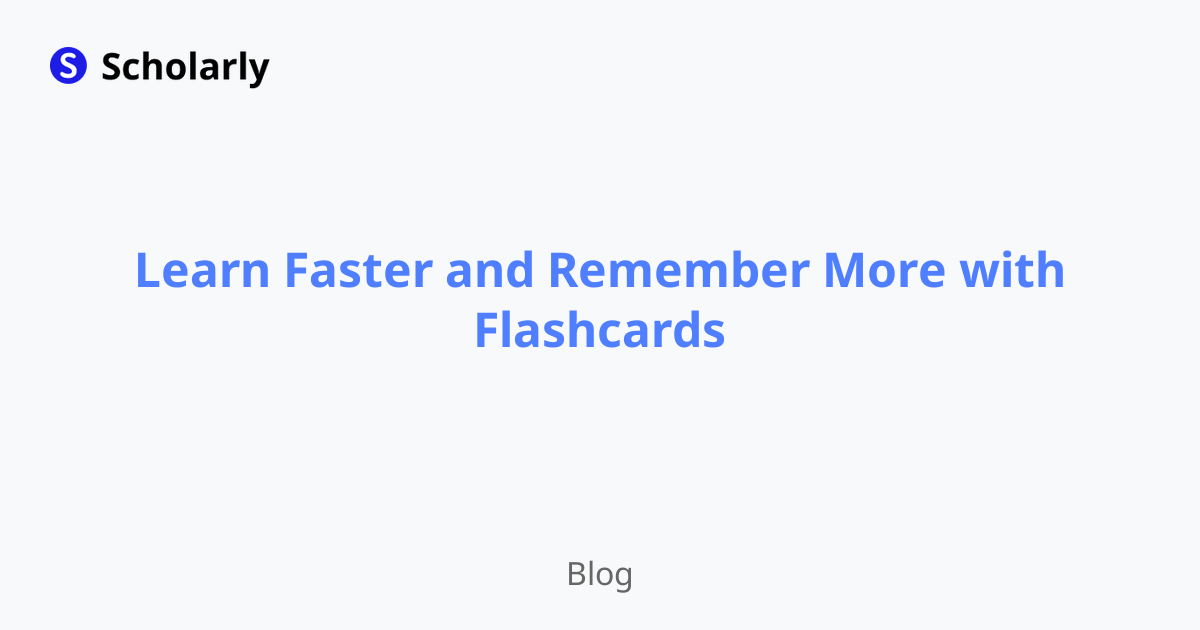Learn Faster and Remember More with Flashcards
Learn how to leverage Scholarly to your advantage and make the most out of your college experience. Scholarly is your secret weapon for college success.

Flashcards are one of the oldest and most effective learning tools. They leverage the power of active recall and spaced repetition to help you quickly memorize key facts, dates, formulas, vocabulary words, and more.
In this post, we'll explore why flashcards are so effective for learning and memory, the science behind them, different types of flashcards and flashcard strategies, and tips for making and using flashcards successfully to boost your learning.
Why Use Flashcards?
Flashcards tap into the science of active recall, where you actively retrieve information from memory instead of passively reviewing. Active recall strengthens neural pathways and improves memory retention.
Flashcards also utilize spaced repetition, reviewing information over time at gradually increasing intervals. This boosts retention by preventing memory decay.
Studies show students who use flashcards perform better on tests than students who simply re-read material.
Key benefits of flashcards:
Improve memorization - Flashcards are ideal for memorizing key facts, dates, formulas, vocabulary. The focused, bite-sized chunks of information make facts stick better.
Boost engagement - Flashcards are interactive. The process of quizzing yourself engages more senses and neural pathways than simply reading.
Portability - Flashcards are small and portable. You can review them anywhere, anytime.
Spaced repetition - Flashcard apps use algorithms to space out card reviews over time based on your memory strength to boost retention.
Instant feedback - Flashcards provide instant feedback on what you know and don't know so you can focus study.
Active learning - Flashcards promote active recall instead of passive re-reading, improving memory.
The Science Behind Flashcards
Cognitive science backs up the effectiveness of flashcards for learning. Here's an overview:
Spaced repetition - Research shows spacing out studying is more effective than cramming. Flashcards use spaced repetition algorithms to optimize learning.
Retrieval practice - Retrieving information from memory strengthens neural pathways. Flashcards leverage retrieval through self-quizzing.
Interleaving - Mixing up topics improves ability to distinguish concepts. Flashcards interleave different topics.
Testing effect - Taking practice tests boosts long-term retention. Flashcards test knowledge.
Chunking - Breaking information into smaller chunks improves memory. Flashcards use bite-sized chunks.
Active recall - Forcing yourself to remember information without looking at the answer improves memory and learning. Flashcards build active recall.
Types of Flashcards
There are many options when it comes to flashcard formats and strategies:
Basic flashcards - Question on one side, answer on the back. The simplest format.
Cloze flashcards - Sentences with key words or phrases removed to fill in. Great for languages, definitions, concepts.
Image flashcards - Use images/diagrams on one or both sides instead of or in addition to text. Helps visual learners.
Multi-sided flashcards - Questions on multiple sides to test information from different angles. Adds variety.
Digital flashcards - Use a flashcard app to make, organize, study, and track flashcards on your devices. Adds options like images, audio, video.
Flashcard Strategies
How you use flashcards can further optimize their effectiveness:
Active recall - Don't just flip flashcards to read answers. Cover the answer and try to recall it from memory.
Spaced repetition - Use flashcard app algorithms or Leitner system boxes to space out reviews based on memory strength.
Interleaved subjects - Mix up flashcards from different topics instead of studying just one topic at a time.
Self-testing - Use flashcards to frequently test yourself leading up to a test for better exam performance.
Group studying - Create collaborative flashcard decks to quiz each other. Teaching others boosts your own learning.
Tips for Making Effective Flashcards
Follow these tips to create quality flashcards for better learning:
Keep information concise - use key words and short phrases instead of full sentences
Chunk related information onto separate cards
Use mnemonic devices like acronyms or imagery to aid memorization
Avoid redundancy - only include the minimum necessary info on each card
Add visuals like simple diagrams, charts, and illustrations
Color code flashcards by topic or theme for easy organization
Leverage apps to add multimedia, organize decks, and optimize studying
Start Learning Faster with Flashcards
If you want to boost memorization, deepen learning, and improve recall, incorporating flashcards should be part of your studying strategy. Use this post to optimize how you make, organize, and leverage flashcards. Then watch your proficiency grow as flashcards help knowledge stick!
Try Our Popular AI Study Tools
Transform your study materials into interactive learning experiences with our most popular AI-powered tools:
PDF to Flashcards
Convert lecture notes and textbooks into study flashcards instantly
Text to Flashcards
Turn any text or notes into comprehensive flashcard sets
Image to Flashcards
Convert diagrams and handwritten notes into digital flashcards
YouTube to Flashcards
Generate flashcards from educational video content



